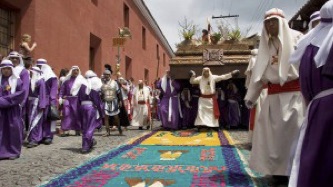GAM(ISMO)
GAM(ISMO)
The world is urbanizing rapidly. At the same time, as German urbanist Kai Voeckler said, the city as we used to know it has disappeared. It has become replaced by something for which we are still lacking clear images and concepts. In Costa Rica, a country typically known for its protected nature, already more than 60% of the population is living in areas that are qualified as urban. The majority is situated in the Greater Metropolitan Area (GAM), which consists of the four historical cities of Alajuela, Cartago, Heredia as well as the country’s capital San Jose. In recent years, the four cities and its peripheries have started growing together, resulting in a large-scale low-density suburban sprawl, which is continuously substituting the agricultural program and nature that used to characterize the central valley and its surrounding mountain ranges.
Today, the GAM appears as a socially segregated and spatially fragmented multitude of different life worlds, neither urban nor rural. Gated communities are contrasted by abandoned historical urban centers, shopping malls and free trade zones are situated right next to low cost housing arrangements or coffee plantations. What are the biggest threats and potentials to the rurban society? How do the inhabitants perceive their city? Who are the dominating cultures or subcultures? What is the relationship between urban green and grey? How is food being produced and delivered? What are the factors for social inclusion or exclusion?
From 2004 to 2008, A company participated in an urban planning program for the Greater Metropolitan Area of Costa Rica in order to generate a shared vision for the country’s urban development at national and metropolitan level. The project was financed by the Costa Rican Government and the European Union. The development of the “Plan Regional Urbano de la Gran Area Metropolitana” (PRUGAM) consisted of individual studies in eight different fields: social processes, urbanism, housing, transportation, water issues, environment, energy, as well as political, administrative and legal issues. The combined information was use to design the legal planning tools for urban development and regulation (“planos reguladores”) of the 32 municipalities within the GAM.
Together with the Latin America Faculty of Social Sciences (FLACSO), A company developed a study on the urban culture of the GAM, combined with the methodology of socio cultural mapping. The citizens’ memories, perceptions, means of orientation and identification are collected and translated into a series of maps that illustrate the cognitive images of the current urban system from the point of view of its users. The collection of information and data is crucial to include the citizen’s opinion about urban strengths and weaknesses and to motivate a future appropriation of built interventions in this bottom up participatory municipal planning process.
About A01
A 01 is a multidisciplinary network organization operating within the fields of urban and rural development. In our globally urbanizing culture, the dichotomies of urban and rural divide, public and private domain, rich and poor, a house and home, the high and the low tech, or the developed and the developing world seem to be dissolving. The city as we know it has been atomized. Spatial transformations have produced a new condition for which we have as yet no adequate models of perception and representation. This complex situation results in a multitude of factors that need to be taken into account in order to allow for planning solutions that are supported and appropriated by clients and target populations.
Our work methodology has been designed to allow for multiple, non-hierarchical entry and exit points. We intend to break the boundaries of a single profession or perspective in order to allow for a holistic approach to shape our products. We aim at social equity, local capacity building and empowerment, the creation of knowledge, opportunity and alliances. We envision an integral sustainable development that improves the living conditions of people without compromising the capacity of future generations or people in other regions. Integral sustainability refers to a long-term impact that involves more than just economic growth, as it requires an equal social development and a responsible use of natural resources. The company is based in San Jose, Costa Rica; A foundation is based in Utrecht, The Netherlands.
A 01 was founded in 2002 by Architect / Urbanist Oliver Schuette (*1970 / Germany) and Anthropologist /
Economist Marije van Lidth de Jeude (*1972 / The Netherlands).
Board members A company : Oliver Schuette, Marije van Lidth de Jeude, Michelle Deugd (Dutch, Agronomist),
Ronald Fonseca (Costa Rican, Architect).
Board members A foundation : Oliver Schuette, Marije van Lidth de Jeude, Monique Swart (Dutch, Cultural Studies),
Mary Denero (U.S.A., Alternative Medicine).
10 – 15 projects are realized per year.
GAM(ISMO)
- Authors: Oliver Schuette, Marije van Lidth de Jeude
- Location: San José/ Costa Rica
- Year: 2002 > ongoing
- URL: http://www.a-01.net/

